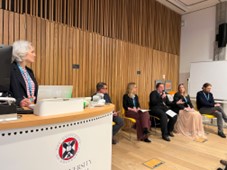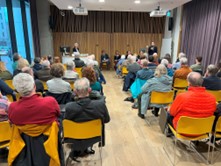TransFIRe researcher, Mark Cassidy, from the University of Edinburgh appeared at the Edinburgh Science Festival this week for a deep dive discussion to explore the latest technologies to around carbon capture and storage.
The panel discussion covered the role of the latest technologies and nature-based solutions to remove capture carbon dioxide from both industrial processes and the atmosphere. Mark outlined the work the TransFIRe project in improving efficiencies and reducing energy waste across the foundation industries and also acknowledged the important potential of CCS technologies within hard to abate foundation industries. However, Mark, whose research is focussed on historical, social and cultural relations around energy transitions, also cautioned about the role of technological optimism when discussing possible solutions around decarbonisation and climate change.
Mark suggested that while it may seem comfortable to look for a technological fix to solve issues such as carbon dioxide emissions, the slow rates of scaling up and deploying some of these promissory technologies suggest that technology alone is not enough. He highlighted how our relationship with carbon and energy is deeply rooted in social, cultural and political practices. He stressed the need for coherent, long-term policies around industry, planning and energy coupled with a strong political and social will to see these through.
Mark discussed how transitioning to a low carbon energy system is a “wicked problem” with no easy solutions. All paths towards reducing carbon emissions will involve some level of social and political change in the way we engage with energy, and that while development and deployment of new technologies are a vital component in this change, they are not, nor should they be seen to be, a “magic wand” that can be waved and allow business as usual.



